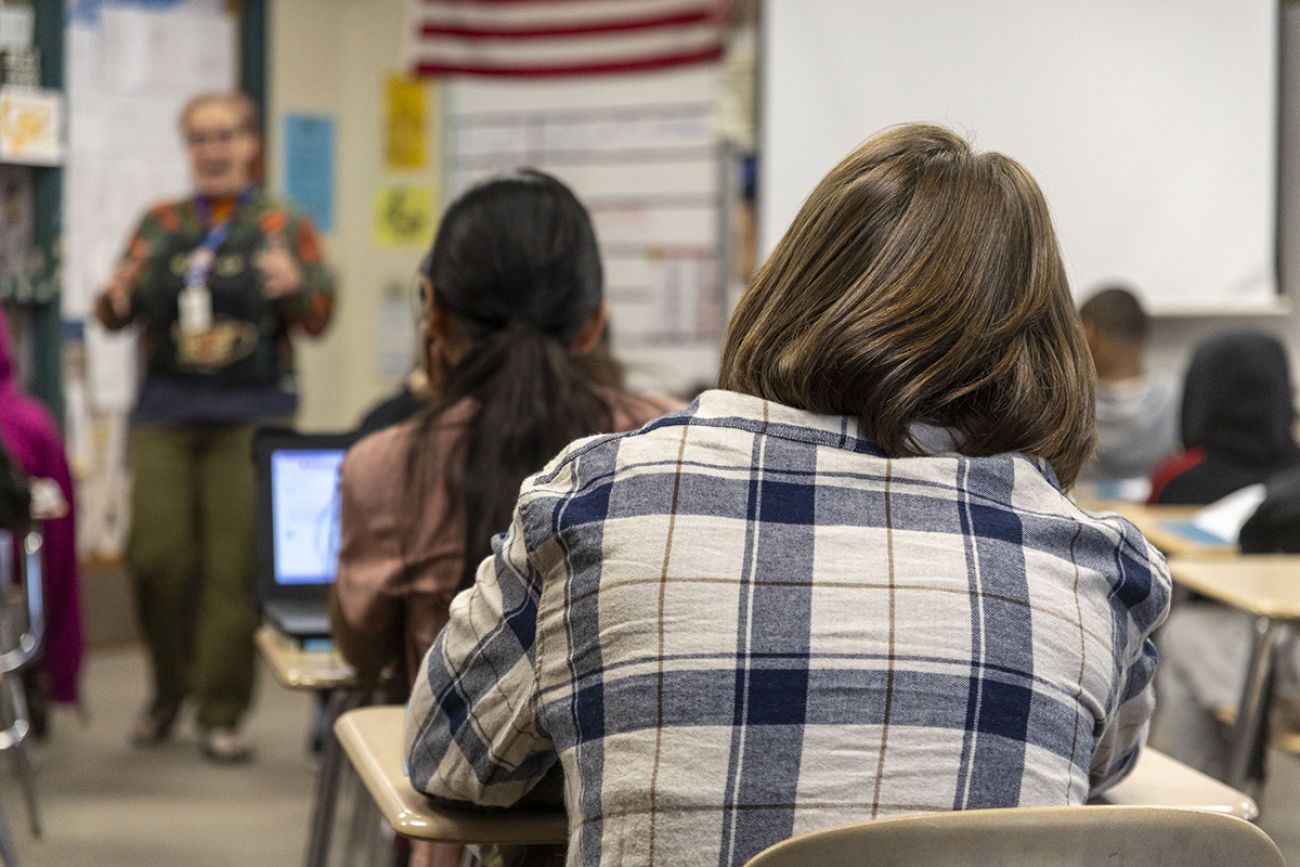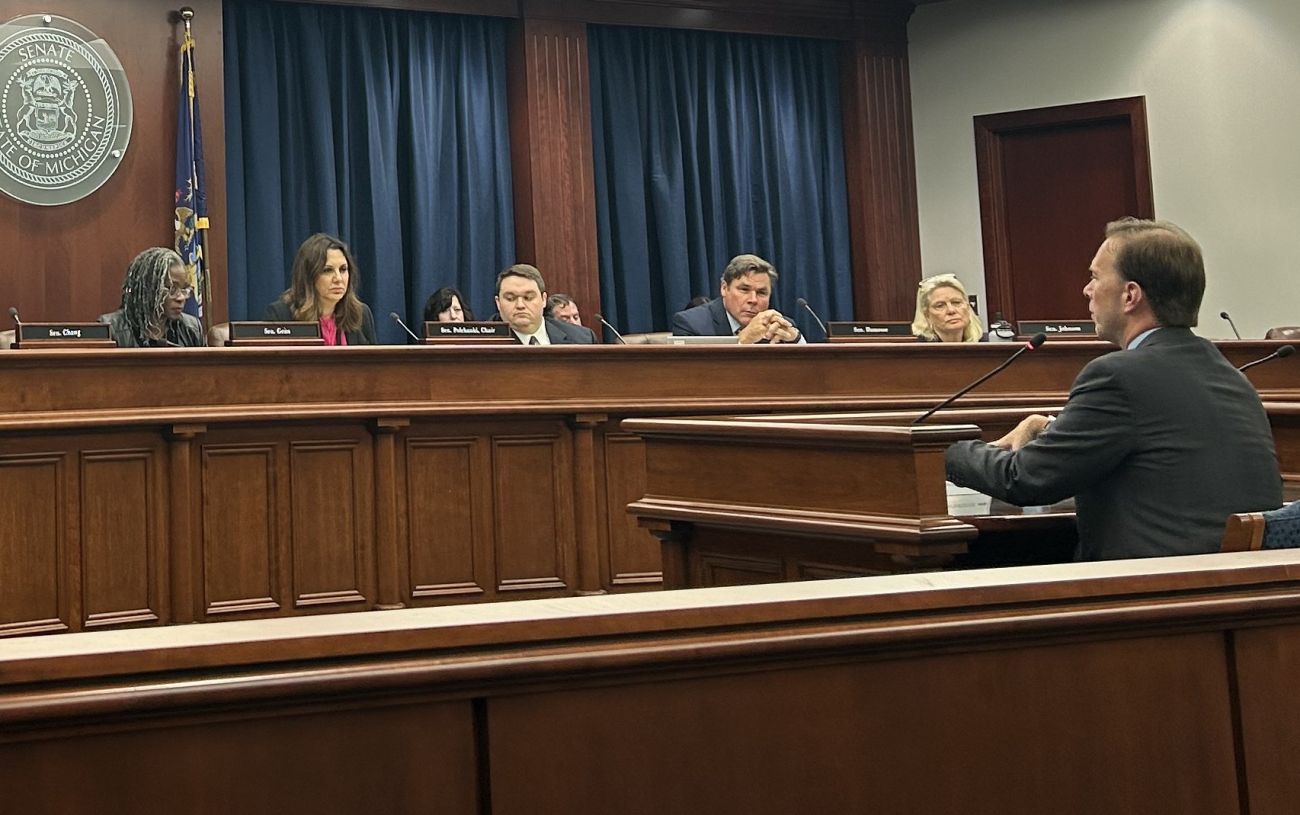Fact check: Michigan schools are struggling. Can these ideas help fix them?

- Michigan has plenty of education problems, from reading scores to teacher shortages
- The Legislature is divided but lawmakers say they’re committed to reforms
- Among them: proposals for uniformed curriculum; a governor-appointed state superintendent and reduced fees
Michigan’s education shortcomings are well known: third graders are behind on reading proficiency, a teacher shortage remains and long-time disagreements persist about who should be in charge of school policy.
In a newly divided Legislature, Michigan House Republicans have proposed a wide-ranging package of bills to highlight effective curricula, allow local teacher certification and shake up how education leaders are selected.
Some Republican-sponsored bills have won bipartisan support in the House but have not yet been taken up in the Democratic-controlled Senate, where the Education Committee has only advanced one bill this session.
“I’m hopeful that the state House, the state Senate, the State Board of Education and Gov. (Gretchen) Whitmer can work together to ensure Michigan is on a path towards improvement,” Nancy DeBoer, a Holland Republican and chair of the House Education Committee, told Bridge.
Sen. Dayna Polehanki, a Livonia Democrat and chair of the Senate Education Committee, told Bridge she was not overly familiar with the House GOP proposals but said some of the ideas — such as waiving teacher certification fees — are “not something I’m opposed to.”

Here’s a look at some of the proposed education reforms up for debate this year in Lansing, what might change and the possibility of passage.
Lawmakers are also considering limiting cell phones in schools and a series of bills aimed at improving school security.
Issue No. 1: A curriculum hodgepodge
The facts: Michigan public schools leaders are free to choose which curriculum to use in classrooms. But companies offer a wide variety of products, which can make it challenging for districts to find effective curriculum or learning materials for students to succeed.
During the 2022-2023 school year, elementary school teachers across the state reported using 444 different curriculum resources for English language arts, according to an analysis by MSU researchers.
“These resources included 154 distinct resources for core (English language arts), 120 for writing instruction, and 170 for phonics and/or spelling,” the report states.
The state provides funding to train teachers on “evidence-based literacy instruction”, and lawmakers passed a bipartisan package last session aimed at improving literacy instruction starting with the 2027-2028 school year. Plus, the state has a new committee tasked with vetting literacy curriculum. Later, districts can apply for state funding to buy these materials.
The legislation: House Republicans are aiming to require the Michigan Department of Education to publish a list of curriculum and testing companies it recommends that meet certain requirements. A school district would not be required to use these materials or companies.
What people are saying:
House Speaker Matt Hall, R-Richland Township, told reporters in March that “we want to create standards” because the efficacy of curricula can vary.

“You see people going on TikTok and Pinterest and all these places to find their curriculums,” he said, describing lesson plans teachers can find online. “We don’t know if these are verified, if they’re real, if they have proven results. … We’re raising the standard for this, because there are no standards.”
Issue No. 2: Teacher shortages
The facts: Some Michigan school districts are struggling to find highly-qualified teachers and retain them.
Researchers with EdTrust-Midwest, a research and advocacy education organization, found that in districts with the most students in poverty, it’s four times more likely that the person leading the class isn’t certified in the subject or grade level they are teaching.
Related:
- Michigan's state Superintendent Michael Rice will retire later this year
- Trump orders end to Department of Education. What it means for Michigan
- Third time’s the charm for Oxford-inspired school safety bills?
Additionally, researchers at Michigan State University found that the state is at an “all-time” high for the number of teachers with a temporary credential.
Over the last few years, lawmakers have passed budgets that include funds for current college students studying to be teachers, stipends for those who are student teaching and funds available to help current school employees become certified teachers.
The legislation: One proposal, which passed the House in March, would allow local school districts to certify a teacher to teach for up to five years even if they do not have a state teaching certificate. The individual would have to have a bachelor’s degree or higher from a regionally accredited college or university in the subject area they would teach.
What people are saying: Beth DeShone, executive director of the Great Lakes Education Project, a group that advocates for school choice policy, told Bridge the bill helps districts cut through “red tape” for hiring teachers.
But the Michigan Department of Education is against the proposal, claiming the “teacher certification process is best administered at the state level so as to provide uniformity” and citing concerns with “unnecessary administrative burden on districts.”
Rachelle Crow-Hercher, director of the Michigan Education Justice Coalition, a group that advocates for more school funding, said she is not supportive of the bill at this time.
“It’s great that they have subject level mastery, but where are they also mastering their teaching skills?” Crow-Hercher said of potential teachers who have not obtained a traditional state certificate. “That’s important to me that I know that my kids’ teachers have mastered teaching, not just a subject area.”
The legislation: Another proposal aimed at teacher shortages would waive certification fees for teachers. The fees can vary, costing as much as $210 for out-of-state first time applicants to as little as $45 for a substitute teaching permit. That bill passed the House 83-26 with bipartisan support.
But a nonpartisan fiscal analysis shows the legislation would reduce state revenue by $8 million, roughly half of which currently supports the Michigan Department of Education's Officer of Educator Excellence, which administers teacher training programs. MDE is opposed to the bill.
What people are saying: Ben Locke, executive director of Teach Plus Michigan, a group aimed at helping teachers get involved in policy, supports the bill and told Bridge he thinks it would help support the teacher workforce.
But Sarah Reckhow, a professor of education at MSU, questioned whether doing away with application fees would encourage more people to go into teaching.
“It doesn’t seem like it would be that much money,” Reckhow said of the maximum $210 applicants have to pay. Likewise, “$8 million is not a lot in the scheme of the entire state education budget.”
Issue No. 3: Transparency for parents
The facts: The state publishes standardized test results, attendance counts and graduation rates for schools and districts. But Whitmer's executive budget proposes doing more to inform parents by requiring school districts to notify parents if they are using a high quality curriculum, and House Republicans are proposing more transparency too.
The legislation: Michigan has a parent dashboard that allows users to look up student performance, attendance and other metrics for public schools. With bipartisan support, the state House in March approved a proposal to require schools to put a link to the dashboard on their website. Under the bill, the state would also need to ensure users can compare different schools on the MI School Data website.
What people are saying: Republicans claim the move gives parents a greater ability to hold districts accountable, as the legislation would require schools annually inform families about key performance metrics, such as performance on state assessments by standard area.
"This is not about adding bureaucracy or burdening schools," Rep. Tom Kuhn, R-Troy, said in committee testimony. "It's about making existing data more accessible so parents can be informed advocates for their children."
No. 4: Switching up education leadership
The facts: Under both Republican and Democrat leadership, state leaders have questioned whether Michigan’s current system for education decision-making makes sense.
Currently, the State Board of Education hires and fires the state superintendent, who does not report to the governor or Legislature and does not have to work cooperatively with either. Voters select board members in partisan elections.
State Superintendent Michael Rice announced this month he would retire later this year. The board, made up of two Republicans and six Democrats, announced its plans to start a search immediately.
The legislation: Republicans have proposed House Joint Resolution E, which if passed by two-thirds of the House and Senate, would ask voters to make the State Superintendent a governor-appointed position by amending the state Constitution.
A Republican-sponsored bill would also change how State Board of Education members are selected so that each member is tied to a geographic region of the state. The bill has not yet gone to a full House vote.
What people are saying:
A bipartisan council appointed by Whitmer to identify policies that could help grow the state's population in late 2023 recommended allowing governors to appoint superintendents.
That would "better align the priorities of the Michigan Department of Education, the State Board of Education, and the governor’s office," the council said in its final report.
But members of the current state board oppose the proposal to make the state superintendent a governor-appointed position.
“It is almost certain that the desire of any first-term governor to be re-elected would result in a focus on short-term, flashy education policies that may seem popular, but would be harmful to students’ educational success,” the board said last week in a resolution adopted by members.
Crow-Hercher, with the Michigan Education Justice Coalition, said she opposes the new governance proposals, arguing the resulting system would be “less Democratic and less accountable to actual voters.”
See what new members are saying about why they donated to Bridge Michigan:
- “In order for this information to be accurate and unbiased it must be underwritten by its readers, not by special interests.” - Larry S.
- “Not many other media sources report on the topics Bridge does.” - Susan B.
- “Your journalism is outstanding and rare these days.” - Mark S.
If you want to ensure the future of nonpartisan, nonprofit Michigan journalism, please become a member today. You, too, will be asked why you donated and maybe we'll feature your quote next time!




